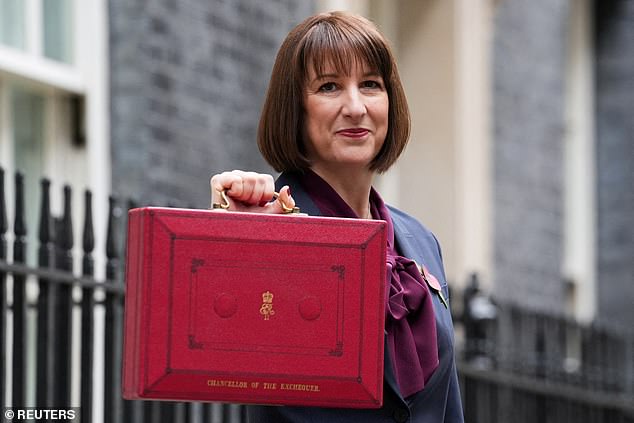Will she, won’t she cut the amount of tax-free cash that we can take from our pension pots?’
It’s a question that is being anxiously asked by hundreds of thousands up and down the country as we hurtle towards Rachel Reeves’s rather scary, tax-grabbing Budget on November 26 – especially by those in their mid-50s and above who are qualified to access theirs.
Currently, many in this age bracket have the right to acquire 25 pc of their pension fund in the form of tax-free cash, subject to a cap of £268,275 (a minority can take out more as a result of having locked into past protected allowances).
Not all exercise this right immediately, though, for a variety of reasons: for example, they’re still working, so have no urgent requirement for the money, or they’re a member of a generous defined benefit pension scheme (typically to be found in the public sector) where full access to tax-free cash and a lifetime income isn’t usually allowed until their mid-60s.
But there are many within the Labour Government who believe the current tax-free pension deal is far too generous – and unfairly skewed towards favouring the wealthy with the biggest pensions.
Adhering to good old-fashioned socialist principles, they want a dose of egalitarianism to be introduced into pensions, resulting in the tax-free limit being given a haircut more in tune with a ‘number one’ (severe) than a ‘number 8’ (a gentle trim).

Black hole: Chancellor Rachel Reeves is widely expected to launch a raid on pension savings in the November budget
‘I’d say there’s a one-in-three chance of the tax-free lump sum being slashed in the upcoming Budget,’ warns Tomm Adams, a partner at accountancy firm Blick Rothenberg.
‘The Treasury is in trouble and I expect some kind of attack on pensions to form part of a raft of tax rises in November.’
By ‘trouble’, Mr Adams is referring to the mind-blowing £50billion hole in the public finances that the Chancellor’s Budget must go a large way to filling.
Failure to do so, some experts warn, could lead to a meltdown in financial markets and Ms Reeves going cap in hand to the International Monetary Fund (IMF) for a bailout – following in the faded footsteps of the late Labour Chancellor Denis Healey 49 years ago.
Four factors suggest a clampdown on pension tax-free cash is coming.
First, the ‘trouble’ Mr Adams talks about is more than twice the troubling £22 billion black hole that the Chancellor claimed she inherited from the previous Conservative government ahead of last year’s Budget. This raises the probability of tax-free pension cash being targeted.
Secondly, the Chancellor’s Budget team this time around includes Pensions minister Torsten Bell, an avid supporter of the ‘number one’ haircut approach to tax-free cash.
In his time as head of Left-wing think-tank Resolution Foundation, he called for a drastic £40,000 cap to be imposed.
Of course, it’s far easier to rant and rave about the fairness of a £40,000 cap from the comfy offices of an economic think-tank than to put such an antagonistic policy into practice as part of an unpopular Labour government.
Some, such as Mr Adams, believe it would be akin to ‘political suicide’, but Mr Bell’s past rhetoric indicates he has an entrenched aversion to tax-free cash.
Thirdly, while this newspaper was recently told by a Whitehall source that a raid on pension lump sums is not ‘currently’ under consideration, it might be in the coming weeks as Ms Reeves and Mr Bell scramble to find ways of shoring up the Government’s dire finances.
Finally, unlike most other tax-raising measures that could be introduced to trim the cost of encouraging people to save into a pension – for example, an overhaul of tax relief on contributions – it’s relatively straightforward to implement.
It’s a point that former pensions minister Steve Webb made in a report published earlier this month on the risks of tinkering with pots in the Budget.
Mr Webb said the existing cap of £268,275 meant it was ‘not a major administrative change to simply set this at a lower level’.
So, what could be the limit?
Although Mr Bell has called for a £40,000 cap to be imposed on pension tax-free cash, a new limit is likely to be around £100,000.
This would still tick most of the boxes for Labour when it comes to targeting the wealthy.
According to research last year by the Institute for Fiscal Studies (IFS), the tax break in its current form costs about £5.5 billion a year – with 70 per cent of the benefit going to the pensions of those accumulated by the top-fifth of earners.
Putting in place a £100,000 cap, it said, would adversely impact one in five retirees, raising £2 billion a year for the public’s finances.
‘A £100,000 cap is a politically safer level than £40,000,’ says Jason Hollands of wealth manager Evelyn Partners.
Whether Labour would be brave enough to move from £268,275 to £100,000 in one fell swoop is debatable. Many experts believe a phased reduction would be fairer.
‘Foisting immediate changes on those who are close to retirement would be so unfair,’ says Elsa Littlewood, a tax partner at accountancy firm BDO.
‘Many have carefully planned their retirement for decades, based on access to 25 per cent tax-free cash. If the cap is reduced, it should be done over time.’
It’s a point also made by James Scott-Hopkins, founder of financial planner Exe Capital Management. He says: ‘It would be grossly unfair not to phase it in, not least because some people would have planned to use their tax-free cash to pay off a mortgage.’
Mr Hollands says that while a cut could be announced in the Budget, it would be ‘unlikely’ to come into immediate effect as happened with last year’s hikes in capital gains tax, so may be from April 2026 or April 2027.
Those with a protected allowance, giving them a right to a higher tax-free lump sum, should not be impacted by any changes. ‘There would be legal challenges galore if these protections were ripped up,’ says Mr Hollands.
Last year, the IFS acknowledged that any reduction which was retrospective would anger those who have saved on the understanding that they would get 25 pc of their pension pot tax-free.
But, ominously, it added: ‘A slower transition would temper that retrospection, but would need to be weighed against the ongoing costs of providing large tax subsidies for individuals with sizeable pension pots.’
Music to Mr Bell’s ears.

Panic: A record £18.3bn of tax-free cash was withdrawn from pension pots in the year to the end of March, compared to £11.25bn the year before
Those who should act now
Mr Hollands says that if you are currently planning to take tax-free cash in the next year, bringing the decision forward several months ‘out of an abundance of caution may be worth doing’.
This, he adds, is especially the case if you have a specific purpose in mind – such as using the cash to clear a mortgage or buy a holiday home.
There is also a case for those with pension pots in excess of £400,000 to take tax-free cash if, again, they are both eligible and were already looking to access it. In doing this, they would secure tax-free cash above £100,000.
Some may wish to access tax-free cash now to ensure they can maximise gifts to loved ones and reduce their estate’s exposure to inheritance tax (IHT) when they die. From 2027, unused pension funds will fall inside the IHT net.
Restrictions in gifting to avoid IHT could feature large in November’s Budget. Yet – and it’s a big yet – accessing tax-free cash now to avoid a possible clampdown is fraught with risk.
Mr Hollands warns: ‘Liquidating a quarter of your pension cannot be reversed and in many cases means moving money from a pot which grows tax-free into a taxable environment.
‘You would also miss out on future investment returns from the part of your pension you have turned into tax-free cash if stock markets rise – and, by implication, the potential for a larger tax-free lump sum if the Chancellor decided not to change the rules after all.’
In addition, there are potential traps awaiting those who take tax-free cash but wish to keep on working and pay into a pension.
For example, any (inadvertent) taxable withdrawal would trigger the so called ‘money purchase annual allowance’, which means any future pension contributions would be restricted to £10,000 a year. The standard annual contribution limit is £60,000.
‘Get professional advice,’ urges Mr Hollands, ‘so that any decision you make is an informed one.’
Data yesterday released by the City regulator shows that, for the year to the end of March, a record £18.3 billion of tax-free cash was withdrawn from pension pots (compared to £11.25 billion the year before).
A big part of this surge was due to thousands of savers withdrawing money from their pots in a panic, fearing a cut to tax-free cash would be announced in last year’s October Budget. It didn’t happen.
Commenting on this data from the Financial Conduct Authority, Jon Greer, head of retirement policy at wealth manager Quilter, said any decision to take tax-free cash ‘should be part of a carefully considered financial plan and not a knee-jerk reaction to rumour’.
Wise words.
And finally
Apart from those aged 55 and over with a big pension pot intact (£400,000 plus) and a pressing financial need on the horizon, the message is loud and clear.
If you have a fund that you have yet to take withdrawals from, don’t get distracted by all the noise surrounding tax-free cash – or possible cuts to tax relief on contributions, for that matter.
Just stay calm, keep your tax-free cash for another day and, if you’re still working, keep paying into your pot month in, month out. It’s the best way to give yourself a splendid chance of a financially secure retirement.
jeff.prestridge@dailymail.co.uk

